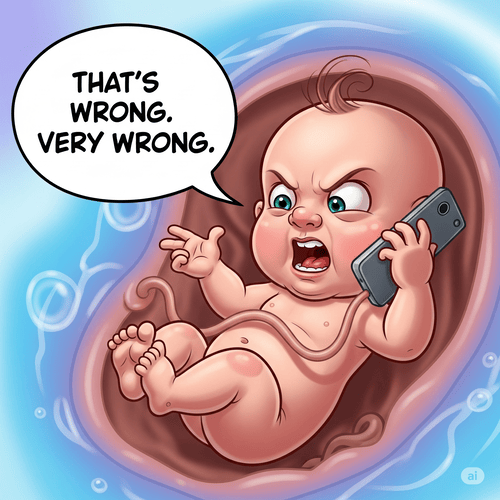Why NT Wright Is Wrong, Very Wrong on Abortion
WHY SCRIPTURE DEMANDS ABSOLUTE PRO-LIFE PRINCIPLES
NT Wright is a respected Bible scholar. His work on Paul’s theology and the historical Jesus, for instance, has shaped evangelical thinking for decades. But on the issue of abortion, Wright has taken a position that contradicts the very Scriptures he has spent his life studying.
Wright argues that while abortion is generally wrong, there are circumstances where Christians may legitimately choose to terminate a pregnancy. His heart is pastoral—he wants to show compassion to women facing impossible situations. But good intentions cannot override biblical truth, and Wright’s position opens a door that Scripture firmly closes.
UNDERSTANDING WRIGHT’S POSITION
Wright doesn’t advocate for abortion on demand. His position is more nuanced and, in some ways, more dangerous because it sounds reasonable. He argues early in pregnancy, before significant development occurs, termination may be permissible in extreme circumstances.
The situations Wright considers include pregnancies from rape or incest, severe foetal abnormalities that are “incompatible with life,” serious threats to the mother’s health, and pregnancies in very young girls. He emphasises pastoral sensitivity, arguing that absolute positions lack the flexibility needed for real-world suffering.
Wright’s theological framework appeals to Christian love and grace. He suggests rigid pro-life positions may be harsh and uncompassionate, failing to account for the complexity of human suffering. He argues for pastoral flexibility within what he sees as scriptural bounds.
The problem is Wright has misread those scriptural bounds entirely.
WHEN DOES LIFE BEGIN? SCRIPTURE SPEAKS CLEARLY
The fundamental question in any abortion discussion is this: when does human life begin? Wright suggests a gradual development of personhood, but Scripture paints a radically different picture.
- David declares in Psalm 139:13-16 that God “formed my inward parts” and “knitted me together in my mother’s womb.” The text doesn’t describe a gradual process of becoming human—it describes God’s intimate involvement with David as a person from conception onward. “Your eyes saw my unformed substance,” David writes, indicating that even in the earliest stages, he was a “me” that God knew and shaped.
- Jeremiah receives an even more startling revelation: “Before I formed you in the womb I knew you, and before you were born I consecrated you” (Jeremiah 1:5). God’s knowledge and calling of Jeremiah didn’t begin at birth, or at some developmental milestone—it preceded even conception.
- The New Testament confirms this understanding. When Mary visits Elizabeth while both are pregnant, John the Baptist “leaped for joy” in Elizabeth’s womb at the presence of the unborn Jesus (Luke 1:41-44). Luke describes this as the action of a person recognising another person, not as mere biological reflexes.
- Even the law protected unborn life. Exodus 21:22-25 prescribes punishment for causing harm to an unborn child, treating such harm as a crime against a person. No, this wasn’t mere property damage.
- Modern science confirms what Scripture teaches: from the moment of fertilisation, a genetically unique human being exists with its own DNA, blood type, and developmental trajectory. There is no magical moment when “non-person” becomes “person”—there is only continuous development of the same individual who began at conception.
Wright’s gradual personhood theory fails both biblically and logically. If personhood depends on development, which developmental milestone makes someone human? Brain activity? Viability? Birth? Each proposed line is arbitrary and dangerous, creating classes of “less human” people who can be eliminated for the convenience of others.
ADDRESSING THE ‘HARD’ CASES
Wright’s position gains emotional power from the genuinely difficult situations he raises. But hard cases make bad law—and worse theology.
Rape and Incest Pregnancy from sexual assault represents genuine trauma, and our hearts should break for women facing this horror. But the child conceived in rape is innocent of the father’s crime. Adding a second victim through abortion doesn’t heal the woman’s wounds—it compounds the tragedy.
God specialises in bringing beauty from ashes. The biblical narrative is filled with stories of God using terrible circumstances for redemptive purposes. This doesn’t minimise the woman’s suffering, but it does call us to trust God’s sovereignty even in the darkest moments.
The church’s response should be comprehensive support, counselling, and love—not the elimination of an innocent child. We must create communities where women facing these situations find overwhelming practical and emotional support, making carrying the child not just possible but genuinely supported.
Foetal Abnormalities Wright’s argument about conditions “incompatible with life” sounds medical and reasonable, but it masks a dangerous assumption: that some human lives aren’t worth living.
Medical predictions are often wrong. Countless families can testify to children who outlived dire predictions or brought unexpected joy despite significant disabilities. But even when predictions prove accurate, the length of life doesn’t determine its value.
Every person, regardless of disability or life expectancy, bears God’s image. The parents who love a Down syndrome child for thirty years aren’t deluded—they’re experiencing the profound truth that human worth isn’t measured by productivity or perfection.
When we allow abortion for foetal abnormalities, we send a chilling message to disabled people in our communities: your lives are mistakes that should have been prevented. This is eugenic thinking dressed in medical language, and it has no place in Christian ethics.
Threats to Maternal Life Circumstances where continuing a pregnancy threatens the mother’s life deserve careful consideration. But we must distinguish between direct abortion—the intentional killing of the child—and medical procedures that save the mother’s life but tragically result in the child’s death.
The principle of double effect allows for treatments that save one life even when they indirectly cause another death, provided the death isn’t the intended goal. Treating an ectopic pregnancy or removing a cancerous uterus falls into this category.
But true either/or situations—where doctors must choose between mother and child—are extraordinarily rare in modern medicine. Most situations Wright describes aren’t genuine medical emergencies but complex social and emotional challenges that demand our support, not our endorsement of abortion.
THE DEEPER PROBLEM: AUTHORITY AND LOVE
WHY NT WRIGHT IS WRONG: Wright’s position reveals two fundamental theological errors that extend beyond abortion to threaten Christian ethics generally.
First, Wright elevates pastoral pragmatism over biblical authority. His desire to be sensitive and compassionate leads him to soften what Scripture teaches clearly. But when human wisdom contradicts divine revelation, the problem isn’t with God’s word—it’s with our understanding or our willingness to submit.
The Bible’s teaching on the sanctity of life isn’t harsh or uncompassionate—it’s the foundation of human dignity and justice. When we compromise biblical truth in the name of pastoral sensitivity, we ultimately serve neither truth nor love.
Second, Wright misunderstands the nature of Christian love. True love protects the innocent and vulnerable, even when that protection costs us something. Love that enables sin or facilitates harm isn’t biblical love—it’s sentimental feeling that contradicts God’s character.
Christian love for a pregnant woman means surrounding her with support, resources, and hope—not offering her an escape route that requires killing her child. Love that truly serves her long-term good will never counsel her to violate God’s law for temporary relief.
WHY NT WRIGHT IS WRONG: A BETTER WAY FORWARD
The church’s response to difficult pregnancies shouldn’t be to lower God’s standards but to raise our support. We need Christian communities that make choosing life not just morally right but practically supported.
This means creating comprehensive networks of care that address every barrier to choosing life. Financial support, housing assistance, childcare, job training, adoption services, special needs support—every resource a woman might need to carry her pregnancy to term and either raise her child or place the child with a loving family.
It means developing ministries that walk alongside women facing unplanned pregnancies, providing not just material support but emotional and spiritual care throughout the pregnancy and beyond. It means churches where single mothers are celebrated, not shamed, and where children with disabilities are embraced as gifts, not burdens.
For women who’ve had abortions, it means offering genuine forgiveness and healing through the gospel, not condemnation. Christ’s grace is sufficient for every sin, including abortion, and the church must be a place where post-abortive women find restoration, not judgement.
WHY THIS MATTERS
WHY NT WRIGHT IS WRONG: Wright’s position isn’t merely an academic disagreement—it’s a fundamental challenge to Christian witness in a culture of death. When respected Christian leaders suggest abortion is sometimes acceptable, they provide cover for believers who want to avoid the cost of truly pro-life discipleship.
The world is watching to see whether Christians really believe what we say about human dignity and the sanctity of life. When we make exceptions, we communicate that our principles are negotiable when circumstances become difficult enough.
But the gospel calls us to a higher standard. Christ didn’t avoid suffering to accomplish our salvation—He embraced it. The Christian life isn’t about finding the easiest path through moral difficulties but about faithfully following Christ regardless of the cost.
CONCLUSION: WHY NT WRIGHT IS WRONG, VERY WRONG
NT Wright has contributed immensely to Christian scholarship and deserves our respect and gratitude. But on abortion, he has allowed pastoral concern to override biblical truth, creating exceptions that Scripture doesn’t permit.
The Bible’s teaching on the sanctity of human life isn’t optional or situational—it’s foundational to the gospel itself. Every human being, from conception to natural death, bears God’s image and deserves protection.
Our calling isn’t to find circumstances where abortion becomes acceptable but to create communities where it becomes unnecessary. We must build churches and support networks so comprehensive and loving that every woman facing an unplanned pregnancy sees choosing life as not just the right choice but the supported choice.
This is hard work that requires sacrifice, creativity, and long-term commitment. It’s easier to make theological exceptions than to build practical alternatives. But the gospel calls us to the harder path—the path that protects the vulnerable and demonstrates God’s love through our actions, not just our words.
Wright is wrong about abortion—very wrong. But our response shouldn’t be mere criticism. It should be the kind of radical, sacrificial love that makes his position unnecessary by ensuring that every child is wanted, every mother is supported, and every life is valued from conception to natural death.
WHY NT WRIGHT IS WRONG: RELATED FAQs
How should Christians respond when other respected theologians like Wright take similar positions? We must distinguish between the person and their position, honouring their contributions while firmly disagreeing where they contradict Scripture. Even great theologians can err on specific issues—Peter needed correction from Paul, and Augustine changed his mind on several doctrines throughout his life. Our ultimate authority is God’s Word, not human scholarship, regardless of how respected the scholar might be.
- What about the Catholic principle of “double effect”—doesn’t this create exceptions to absolute pro-life principles? The principle of double effect doesn’t create exceptions but provides ethical guidance for tragic situations where death occurs as an unintended consequence of life-saving treatment. The key distinction is between directly intending to kill the child (abortion) versus accepting the tragic but unintended death that may result from treating a life-threatening condition in the mother. The intention and the action matter morally, not just the outcome.
- How do we address the argument that forcing women to carry pregnancies to term is “using women as incubators”? This argument fundamentally misunderstands pregnancy and parenthood. Pregnancy isn’t “using” a woman but recognising the natural biological relationship between mother and child that already exists. Once conception occurs, there are two human beings to consider, not one. True feminism should protect both women and their children, not pit them against each other in a false choice between women’s rights and foetal rights.
What about countries where abortion is legal – should Christians support making it illegal even for non-Christians? Christians should absolutely advocate for laws that protect innocent human life, regardless of the religious beliefs of those affected. We don’t limit laws against murder, theft, or child abuse to Christians only—we recognise these as universal moral principles that protect society. The sanctity of life isn’t merely a religious opinion but a foundational principle of justice that benefits everyone, believer and non-believer alike.
- How do we respond to the argument that banning abortion just makes it dangerous and illegal, not rare? This argument assumes legal abortion is inevitable and we should just make it “safe.” But Christians are called to pursue both legal protection and cultural change that makes abortion unthinkable, not just illegal. When we combine legal protection with comprehensive support systems, adoption services, and cultural transformation, we can dramatically reduce abortion rates while protecting both mothers and children from the physical and emotional harms of abortion.
- What about cases where doctors say the mother will die without an abortion? Genuine medical emergencies requiring immediate intervention to save the mother’s life are extraordinarily rare in modern medicine, and often involve situations where the child cannot survive anyway (like ectopic pregnancies). In these tragic cases, treating the mother’s life-threatening condition is morally permissible even if it results in the child’s death, provided the death isn’t the intended goal. However, we must be careful not to expand this narrow exception into a broader justification for elective abortion.
How can individual Christians make a practical difference in supporting life beyond just voting? Christians can volunteer with pregnancy resource centres, support organisations that help single mothers, advocate for improved adoption services, and create church ministries that provide practical support like childcare, financial assistance, and mentoring. We can also foster or adopt children ourselves, support families with special needs children, and use our professional skills (medical, legal, counselling) to serve life-affirming causes. The goal is making every local church a place where choosing life is the supported choice, not just the right choice.
WHY NT WRIGHT IS WRONG: OUR RELATED POSTS
- Foetal Consciousness: How New Insights Strengthen Pro-Life Position
- Can I Be Pro-Life But Not Religious? 7 Scientific Arguments
- At Conception or First Breath: When Does Human Life Begin?
- Against the Tide: Why are Christians Rigidly Pro-Life?
- The Hidden Costs of IVF: What Fertility Clinics Don’t Tell You
Editor's Pick

The Nashville Statement: Why Affirm It Despite Media Backlash?
WHY DO REFORMED CHRISTIANS STAND BY THIS STATEMENT ON MARRIAGE AND GENDER? When the Nashville Statement was released in 2017, [...]

Who Is Belial? Solving The 2 Corinthians 6:15 Mystery
Belial: This name from the pages of Scripture chills the soul. Who is this mysterious figure Paul invokes in 2 [...]

Celibacy Or Castration: What Jesus Really Means in Matthew 19:12
One of Scripture's most shocking misinterpretations led theologian Origen to castrate himself in the third century. His tragic mistake? Taking [...]

Philippians 4:13: Did Paul Really Mean We Can Do ALL Things?
"I can do all things through Christ who strengthens me." It's on gym walls, graduation cards, and motivational posters everywhere. [...]

The Ordinary Means of Grace: Why Are They Indispensable?
ORDINARY MEANS FOR EXTRAORDINARY TRANSFORMATION What if God's most powerful work in believers' lives happens through the most ordinary activities? [...]

Is the Bible God’s Word? Or Does It Only Contain God’s Word?
The authority of Scripture stands at the crossroads of modern Christianity. While some argue the Bible merely contains God’s Word [...]

Will We Remember This Life in Heaven? What Isaiah 65:17 Means
"Will I remember my spouse in heaven? My children? Will the joy we shared on earth matter in eternity?" These [...]

From Empty to Overflow: The Abundant Life Jesus Promised
(AND WHY YOU SHOULDN’T SETTLE FOR LESS) We're surviving, but are we thriving? If we're honest, there's a gap between [...]

What Does Jesus Save Us From?
THREE BIBLE TRUTHS ABOUT SALVATION "Jesus saves." We’ve seen it on bumper stickers, heard it shouted at sporting events, maybe [...]

If God Wants Everyone Saved, Why Aren’t They?
THE REFORMED VIEW ON GOD’S DESIRE VS HIS DECREE The question haunts every believer who has lost an unbelieving loved [...]
SUPPORT US:
Feel the Holy Spirit's gentle nudge to partner with us?
Donate Online:
Account Name: TRUTHS TO DIE FOR FOUNDATION
Account Number: 10243565459
Bank IFSC: IDFB0043391
Bank Name: IDFC FIRST BANK






